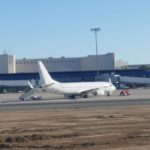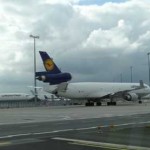Near-term slowdown in growth seen as short-term
Kuala Lumpur, Malaysia – Boeing said that world air cargo growth will expand at a 5.8 percent annual rate over the next two decades, with worldwide air freight traffic tripling through 2027, according to Boeing’s World Air Cargo Forecast 2008/2009.
Air cargo traffic will grow over the long term despite current near-term market weakness and worldwide economic uncertainty. The industry has shown strong recoveries from previous economic downturns such as the Asian economic crisis, the 9/11 attacks and the SARS outbreak.
Boeing released the biennial forecast, which is widely cited by airlines and industry groups, at the International Air Cargo Forum and Exhibition 2008 in Kuala Lumpur. „Our research tells us that long-term economic growth, freighter fleet renewal and moderating jet fuel prices will stimulate air cargo traffic growth,“ said Randy Tinseth, vice president, Marketing, Boeing Commercial Airplanes. „These positive prospects will prevail despite the industry’s concerns about our current economic challenges.
„World GDP is projected to average just higher than 3 percent during the next 20 years,“ Tinseth said. „Asian production fundamentals – including abundant raw materials and low-cost labor – remain solid, and China will remain a source of strong economic growth with substantial industrialization and related investment.“
Cargo tends to be at the forefront of increased liberalization of air services, which is a driver of economic growth.
Asian air cargo market growth will continue to lead all global traffic routes. Domestic Chinese and intra-Asian markets will grow 9.9 percent and 8.1 percent per year, respectively. Asia-related markets will experience growth in excess of the global average.
„We’ve seen market contraction during the middle of this year for the first time since late 2003; however, history tells us that the air cargo market returns robustly when the economy strengthens,“ said Jim Edgar, regional director, Marketing, Boeing Commercial Airplanes, and a contributor to the forecast. „Air cargo remains crucial to globalization.“
Boeing predicts the world freighter fleet will increase to 3,890 airplanes from 1,950 during the 20-year period. Large freighters such as the Boeing 747 and 777 ultimately will represent 35 percent of the fleet, compared to 26 percent today, while providing 74 percent of total capacity. This segment will require 640 new factory-built airplanes. More than 75 percent of the 3,360 freighters joining the fleet – 2,500 airplanes – will come from passenger-to-freighter modifications, while 860 will be new production freighters.
Edgar noted that Boeing provides the most complete and efficient freighter product line, including new production freighters and passenger-to-freighter conversions, teaming with industry leaders to provide innovative conversion solutions to match virtually any air cargo requirement.
The World Air Cargo Forecast 2008/2009 is available at boeing.com/commercial/cargo and the full text is downloadable in PDF format. Boeing has published the biennial World Air Cargo Forecast as an individual report since 1986.




